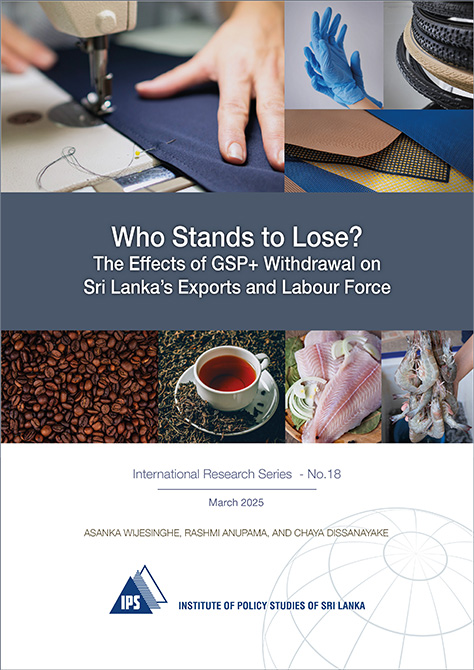
Sri Lanka could lose up to US$1.23 billion in export revenue if the European Union (EU) withdraws its preferential trade access under the Generalised Scheme of Preferences Plus (GSP+), according to a new report by the Institute of Policy Studies (IPS).
The study warns of severe economic and labour market repercussions, particularly for Sri Lanka’s key export sectors and its vulnerable workforce.
The GSP+ scheme allows developing countries duty-free access to EU markets in exchange for commitments to uphold 27 core international conventions related to human rights, labour rights, sustainable development, and good governance. Sri Lanka was re-granted access to GSP+ in 2017, after having lost it in 2010 due to human rights violations during and after the final stages of the Mullivaikkal genocide.
Since then, however, campaigners and human rights organisations have repeatedly called for the revocation of GSP+ status, citing Sri Lanka’s continued failure to meet international human rights obligations.
The European Parliament itself passed a resolution in 2021, expressing “serious concern at the rapid deterioration of human rights” on the island and warning that Sri Lanka's continued use of the draconian Prevention of Terrorism Act (PTA), placed the country in breach of its GSP+ commitments. The resolution urged the EU Commission to initiate the process to withdraw GSP+ if tangible progress was not made.
The IPS study, titled “Who Stands to Lose? The Effects of GSP+ Withdrawal on Sri Lanka’s Exports and Labour Force”, estimates that exports to the EU could fall by 36.7% if Sri Lanka reverts to Most Favoured Nation (MFN) tariffs in the absence of GSP+.
“The GSP+ preference erosion in the EU-28 market is worrying, as it will dwindle Sri Lanka’s export value while impeding the diversification of its export product basket towards products with high technology content,” said IPS researchers Dr. Asanka Wijesinghe, Chaya Dissanayake, and Rashmi Anupama.
One of the hardest-hit sectors would be wearing apparel, where tariffs could rise by nearly 10 percentage points, despite the sector not fully utilising existing GSP+ benefits. The high-tech export sector, particularly transformers, could see a 10% drop in exports, further threatening industrial competitiveness.
The potential loss of GSP+ would have a profound impact on Sri Lanka’s formal manufacturing sector, with an estimated 73,574 workers at risk. In the apparel sector alone, 13.47% of workers could face job losses due to reduced demand from the EU, threatening to exacerbate Sri Lanka’s already fragile labour market.
“Sri Lanka has a strong economic incentive to comply with the agreed-upon conventions, which is a condition for the tariff preference. Despite the variation in utilisation rates, the export effect of preference erosion will be substantial,” the report warns.
Although Sri Lanka may eventually outgrow its eligibility for GSP+ as its income level rises, the IPS study stresses that losing it now, at a time of deep economic vulnerability, would be especially damaging.
The warning comes as Sri Lanka continues to reel from its worst economic crisis in decades, triggered by a sovereign debt default, inflation, and austerity measures imposed by the International Monetary Fund (IMF). Amid this economic turmoil, the state’s reluctance to engage with international demands for justice and accountability has drawn increasing criticism.
The EU has repeatedly stressed that continued access to GSP+ is conditional on Sri Lanka’s compliance with UN human rights mechanisms and the repeal of abusive legislation like the PTA. Yet, the government has shown little political will to pursue meaningful accountability for war-time atrocities, particularly those committed during the Mullivaikkal genocide in 2009.
Instead, the state continues to defend accused war criminals, maintains a militarised presence in the Tamil North-East, and has targeted civil society and journalists.
Read the full study here.
